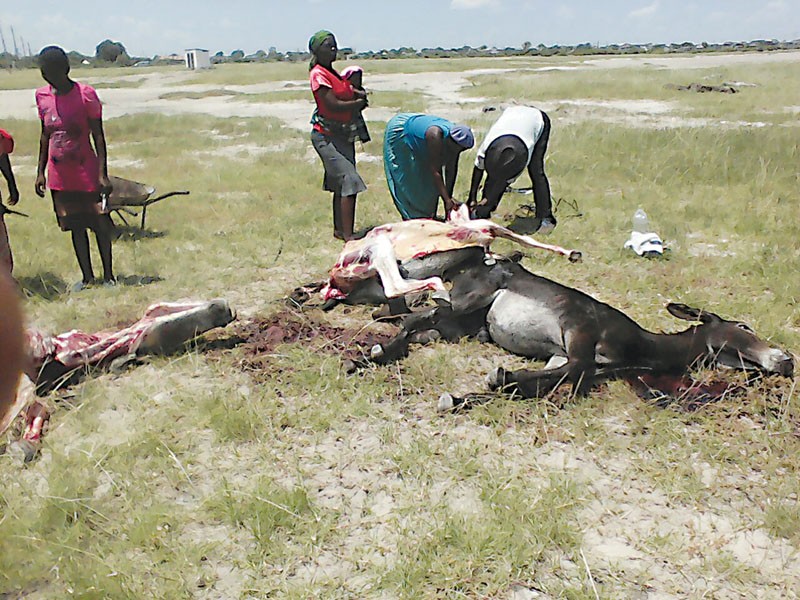Chinese medicine soars donkey slaughter in Boteti
Baboki Kayawe | Friday February 17, 2017 11:26


A Chinese company, Y2K Holdings- trading in global skin is behind the mass slaughters.
A middle-aged man of Mopipi village who witnessed the mass-killings described it as bizarre, as the lot is put in one area and then bullets are fired.
“Lots of donkeys laid lifeless on the ground. They were then skinned. The Chinese collected the hides and harvested sexual organs and then departed, while the flesh is left to the villagers to feast on,” he said.
The man is clueless about the use of these organs.
“We hear that they export to China. We are in the dark about the reasons,” the young man who declined to be named said.
“They come for slaughter every Tuesday,” he added. Renowned Boteti young farmer, Mmoloki Baganetseng is an agent for the Chinese mega-business. He told Mmegi yesterday that the Chinese started stocking hides from the area a month ago.
“They are licensed and they export the hides and sexual organs to China, but I don’t know what these are used for once they reach the Chinese land,” Baganetseng said.
The process of selling requires farmers to register their animals with the local Customary chief, and produce an affidavit confirming the donkey ownership to curb thefts, said sources.
The Chinese company pays P550 per donkey. Baganetseng gets a commission of P150 per donkey head.
Baganetseng is of the view that somehow the Chinese demand for donkey hides is uplifting people’s livelihoods and would help control their (donkey) population since they have been destroying fields. He hopes this will transform donkey farming into a viable business on the same level with cattle and small-stock farming.
As a result, the young entrepreneur said he was motivated to venture into donkey rearing on a commercial scale.
However, he feared for arable farmers who use donkeys as draught power, as they would be left with nothing to use if the demand continues at this rate.
Chinese medicine is fuelling the rise in donkey slaughter for global skin trade, Mmegi has established Demand for hide, used to make traditional ejiao, has hiked the price and rate of slaughter of donkeys, endangering the livelihoods of those who rely on them for a plethora of activities.
China is the major importer of donkey skin and exports from several countries – including Afghanistan – have been confirmed.
According to information published by the Donkey Sanctuary end of January 2017, thousands of donkeys in developing countries are being killed and their skins sold to China for use in traditional medicine.
Demand for donkey hide, which is boiled to produce gelatine – the key ingredient in a medicine called ejiao – has raised the price and the rate of slaughter of the animals, threatening the livelihoods of poor communities who rely on them.
The emergence of the global trade in donkey hide is attributed to the rise of China’s middle class and increased perception of the medicine’s efficacy.
Mmegi’s previous research conducted in Beijing in 2015, revealed ejiao can sell for up to P3,878 per kilogramme.
The Donkey Sanctuary defines ejiao as a hard gel, which can be dissolved in hot water, or alcohol to be used in food, drink or in beauty products such as face creams.
“Ejiao is believed to improve blood circulation so it is used as a blood tonic by people with anaemia, low blood cell counts or reproductive problems,” says the site. Botswana started issuing permits for those interested in donkey meat export.
At the time of the announcement, one investor was reportedly planning to aggressively tap into the 300,000-strong donkey population in Botswana.
“If this turns out to be a lucrative market, Batswana will also benefit a lot from it because donkeys have, to some people, been perceived as useless animals.
The investors’ main customer will be Hong Kong, but they will also be exploring other markets elsewhere to maximise their profits,” said Patrick Ralotsia, the Minister of Agriculture in a previous press interview.
It is understood the main challenges in producing the export permits have been satisfying the South Africans on transit permits, particularly after authorities in that country strengthened the beef export and import regulations.
Asked for a comment, neighbouring Boteti East MP Setlhomo Lelatisitswe said the trade is only short-lived, as before long donkeys will be extinct in the area.
“It would rather impoverish them because donkeys have been a mode of transportby most inhabitants of Botet, and it is used to plough,” he said.
He added that he thinks when issuing licences, Government did not consider the impacts of mass-slaughters on community livelihoods.
At the rate at which the Chinese are said to be buying donkeys, he foresees doom in the near future. Efforts to get a comment from the Ministry of Agriculture on the latest donkey slaughter trends were futile.
